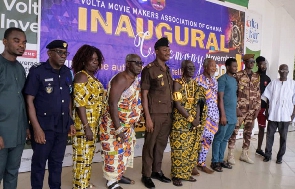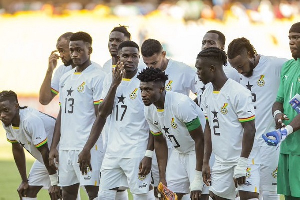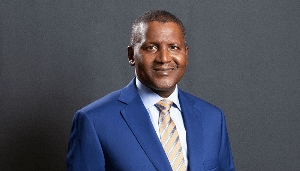The Volta Movie Makers Association of Ghana (VMMAG), has launched its presence in the region, with a call on the government and other stakeholders in the film industry to commit more resources to the creative arts industry.
In a welcome address at the inaugural ceremony held in collaboration with the Center For National Culture (CNC) in Ho on Thursday, November 30, Blackmore Anthony Ayivor, founder and president of the newly inaugurated association said the vision to form an association to bring filmmakers in the region was set in motion in 2016, having realized that the Volta Region is full of creative talents and rich cultures.
"The movie industry is one body that can package all of these beautifully and send it to the world. This is one of the ways tourists develop interest in what they see in our movies to come to see and experience in real life what they see on the screen and make our region a very good tourist destination in Ghana. Unfortunately, the Volta movie industry was at the bottom among other regions in the country".
"One could hardly see any Ewe movies on any TV station in the country. This is aggravated by the lack of TV stations in our region. The fact is that we don't document the authentic stories of our communities but try to copy other country's cultures which gets our viewers especially our folks at home and abroad wondering what sort of story they are watching. The fact is that movie producers in the region operate on an individual basis therefore no serious attention is given to the end products".
"Most often, the complaints you hear are our rich men in the region don't want to help us in the industry - Movie making is a serious business that requires business acumen. No investor would like to put his money in any venture that will not yield any good profit", he explained.
To address this shortfall, Ayivor said there is a need for movie makers in the region to come together to find ways and means to knit the loose ends and close the gaps to make the industry a viable one.
"We believe this is the only way we can attract the government's attention as well as the investors who may be interested in movie productions, he said.
The VMMAG President said traditional authorities in the region are an integral part of the industry because of the immense role they play as custodians of culture and tradition.
He called for good rapport between the traditional authorities and the filmmakers which he said can help polish the knowledge of movie makers about cultures from the various towns across the region.
"Our regional heads of departments are not left out because you also have the same roles as our chiefs. In our movies, we play the role of all of you depending on the storylines. We hope you will also open your doors for us to ask and know more about certain aspects of your duties so that you are well-represented in our movies," he said.
However, he lamented the difficulty faced by filmmakers in accessing accouterments from the various state departments to churn out professional movies.
"Sometimes the bureaucratic incumbrances make it tiring for us to want to come to ask for your assistance to use your facilities. We hope this issue will be addressed soon to boost our work"
"The Ministry of Tourism, Arts and Culture is our family house. Our activities complement each other. We are the ambassadors of the Creative Arts industry, whose works inform the tourists and investors to come to do business here through what they see in our audiovisuals," Ayivor indicated.
He appealed to the government: "To address some of its pertinent issues like the provision of cinema halls, rejuvenating in our population the love of going to the movies as it used to be in the early times. Most of these halls have been turned into churches in the cities. We need them back aside the modern trends of social media to sustain our industry locally".
He said the mission of VMMAG is to give a new dimension to the movies produced in the region to depict authenticity, culturally and traditionally to meet the demand of the local, national, and international broadcasting standards with the vision to protect the people's heritage.
In a keynote address delivered on his behalf, a lecturer at the University of Glasgow School of Education, USA, Dr. Gameli Tordzro said filmmakers in the region can re-emerge through the link between "how we shape a new narrative for ourselves and develop morally, socially, economically, culturally and spiritually, with a focus on our language because we need to make our films in Eʋegbe if we want to develop as a people."
"I encourage all of us to pursue a total reframing of our mindset about ourselves, our values, and how we project ourselves into the future. Our education system and the curriculum are still based on the model that served colonial interests which have led us further and further away from our own value systems. It has led us away from our own ways of conceptual understanding and perceptions. We have the tools as artists to change that".
"One of the negative results of the Western model of education we have all become victims of is how it leaves us continually competing with each other even in spaces where we are better off as collaborators and co-creators"
"Crucially this is linked to the fact that we need the kind of credibility that generates the confidence of investors. The film industry only thrives on good investment. Our profession is a collaborative one, and so we must endeavour to find sustainable ways of collaborating, working hand-in-hand, and building a momentum that propels us to success as an industry with roots in the most beautiful region of this nation," Dr. Tordzro indicated.
The ceremony was patronized by stakeholders in the creative arts industry as well as traditional leaders and some heads of state departments among other dignitaries.
Entertainment of Tuesday, 5 December 2023
Source: Leo Nelson, Contributor

















